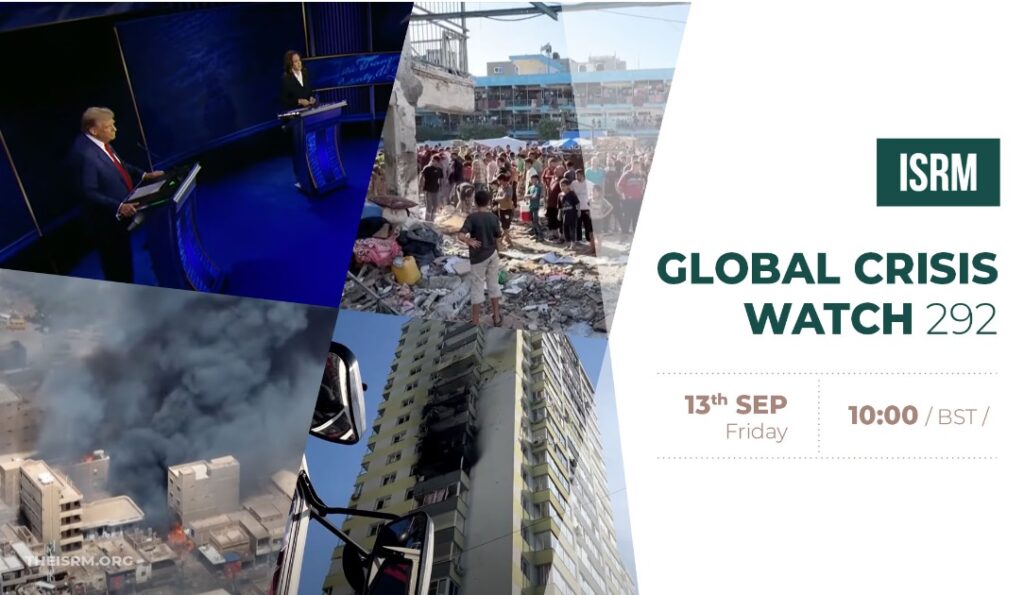The Institute of Strategic Risk Management’s (ISRM) latest Global Crisis Watch, happening tomorrow, Friday September 13, at 10.00 BST, will include as its topics the latest in the US election, where the outcome still remains uncertain, the latest in Gaza, namely recent strikes which injured women and children, the recent deadly drone attack in Moscow by Ukraine, and the airstrikes in Khartoum which are deepening civilian suffering in the Sudan conflict. See more about the topics, and registration details below.
Harris triumphs in debate, but election outcome uncertain
In the first presidential debate between Kamala Harris and Donald Trump, Harris emerged as the stronger performer by continuously putting Trump on the defensive. Over the course of 90 minutes, Harris frequently challenged Trump on his policies and past actions, including the Capitol riot, his administration’s officials turning against him, and his controversial rally crowd sizes. Trump often took the bait, focusing more on defending himself than on core issues like the economy, inflation, and immigration. Harris capitalized on these moments, delivering sharp critiques on topics like tariffs, which she dubbed a “Trump sales tax,” and abortion, where she framed recent state bans as “Trump abortion bans.” Despite his attempts to shift the focus, Trump appeared flustered and disconnected from key voter concerns, repeatedly engaging in lengthy defenses. Harris, on the other hand, stayed composed and used her platform to outline a positive vision for the future.
Polls and betting markets following the debate showed Harris as the clear winner, but analysts noted that debate wins don’t always translate into electoral success. Trump still holds significant sway on key issues such as immigration and the economy, which are likely to dominate voter priorities in the lead-up to the election. Nevertheless, Harris’ strong performance and ability to rattle Trump left her campaign optimistic for future debates and the final outcome.
Women and children among casualties in latest Israeli strikes on Gaza
Israeli airstrikes on Wednesday killed at least 25 Palestinians, including 16 women and children in Gaza and five in the occupied West Bank, according to health officials. In Gaza, the strikes targeted residential areas, with the Israeli military claiming to have struck senior Hamas militants. However, the Gaza Health Ministry, which does not distinguish between civilians and fighters, reported heavy civilian casualties. The strikes also hit Tubas in the West Bank, where Israeli forces claim to have targeted militants. However, the Palestinian Health Ministry has not clarified if the victims were civilians or fighters.
These airstrikes are part of escalating Israeli military operations, particularly in the West Bank, where areas like Jenin have seen intense military action. Gaza’s Health Ministry reports that over 40,000 Palestinians have been killed since the Israel-Hamas war began last October, with around 90% of Gaza’s 2.3 million residents displaced. Meanwhile, over 200 Palestinian patients, mostly children, are set to leave Gaza for medical treatment in the UAE, marking the largest medical evacuation through Israeli-controlled crossings since the conflict began. Gaza’s borders have remained sealed since May, with the Kerem Shalom crossing now facilitating medical departures for the first time since the fighting intensified.
Deadly drone attack on Moscow marks new Phase in Ukraine conflict
Ukraine launched its largest drone attack on Moscow to date, killing at least one woman and damaging numerous homes. Russian authorities reported that they intercepted and destroyed over 20 Ukrainian drones in the Moscow region, which houses more than 21 million people, and an additional 124 drones across other regions. The strikes disrupted operations at three of Moscow’s major airports for over six hours, forcing around 50 flights to be diverted.
In Ramenskoye, a district southeast of Moscow, residents experienced explosions, fires, and significant damage to buildings, with one person killed and several others injured. This marked a new escalation in the drone war between Russia and Ukraine, which has increasingly targeted areas deeper within Russian territory. Meanwhile, Russia also launched overnight drone strikes on Ukraine, with Kyiv claiming to have shot down 38 of the 46 drones.
While Russian President Vladimir Putin has condemned the Ukrainian drone attacks as “terrorism” targeting civilian infrastructure, Kyiv maintains its right to strike back against Russian aggression. Moscow has largely been insulated from the war until recently, despite Russia’s relentless missile and drone campaigns that have destroyed much of Ukraine’s infrastructure over the past two-and-a-half years. Both nations have heavily relied on drones in this conflict, turning commercial models into lethal weapons.
Ukraine has not officially commented on Tuesday’s strikes, which follow earlier attacks in September targeting Russia’s energy facilities.
Airstrikes in Khartoum deepen civilian suffering in Sudan conflict
Sudan’s ongoing civil war between the Sudanese Armed Forces (SAF) and the paramilitary Rapid Support Forces (RSF) has led to widespread devastation, particularly in Khartoum and Darfur. A September 10 airstrike by the SAF on a market in Khartoum killed 47 civilians, injuring more than 80, in what activists describe as a deliberate targeting of areas where RSF forces are embedded. Since the conflict erupted in April 2023, over 18,000 people have been killed and more than 10 million displaced, while the UN warns of a looming humanitarian catastrophe, with half the population facing acute hunger. The SAF and RSF are both accused of committing war crimes, with indiscriminate bombings of civilian areas, schools, hospitals, and infrastructure. The RSF, a paramilitary group with roots in Darfur’s Janjaweed militias, controls significant territory, particularly in Khartoum. Its strategy of embedding fighters in civilian areas to avoid SAF airstrikes has further endangered civilians, while the SAF’s air raids, targeting RSF positions, have led to high civilian casualties. Both sides are vying for control of Sudan’s political and military power, which has long been centralized in Khartoum. The conflict has also exacerbated regional rivalries, with Darfur, historically marginalized, experiencing some of the worst violence. Activists and residents increasingly doubt the army’s claims of protecting civilians, as airstrikes continue to claim lives. International pressure, including from the UN, has called for a ceasefire and arms embargo, but the Sudanese government has rejected these demands.
To register, click here
For more ISRM news, click here





